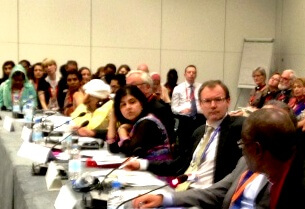Key importance has been given this week to the contribution of faith leaders and faith communities in the fight to end sexual violence in conflict.
In a high level event to reflect on the role of faith at the Global Summit to End Sexual Violence in Conflict, Archbishop Justin Welby and Archbishop Bernard Ntahoturi spoke powerfully on the priorities for action.
The ministerial dialogue, which was chaired by Baroness Warsi, Senior Minister of State at the UK Foreign Office and Minister for Faith, included interventions from the Cardinal Vincent Nichols, Sheikh Abdallah Bin Bayyah from Saudi Arabia and Solange Mukamana from South Africa.
This was the third event where the Anglican Alliance worked as part of the We Will Speak Out Coalition to highlight the role of faith leaders and faith communities in preventing and responding to sexual violence.
The strong Anglican commitment to this issue was demonstrated by the presence of four Anglican Archbishops at this event: Archbishop of Canterbury, Archbishop Bernard Ntahoturi of Burundi, Archbishop Henri Isingoma of Congo and Archbishop Onesphore Rwaje of Rwanda.
The dialogue was an opportunity to speak to ministers and senior policy makers from governments, the United Nations and the European Union.
In his presentation, Archbishop Justin said, “It is no use trying to tackle sexual violence unless that process is integrated into measures to deal with issues of conflict. Practically that means the provision of support for civil society”.
Archbishop Justin talked about the practical measures in care for survivors of sexual violence, reflecting on a recent visit to initiatives with the Anglican Church, HEAL Africa and Tearfund in Eastern DRC. He said, “There was the most remarkable operation to care for those who were suffering the after effects of rape and of sexual violence generally. That was being done through post-trauma support and through micro-finance to deliver the opportunities for new employment.”
He also stressed the issue around justice and impunity. He said, “We have to have a system that challenges impunity, where governments say publicly that anyone involved in sexual violence will, at some point, be caught up with and will answer for their crimes. And there has to be sufficient fear of that justice that it begins to have an effect on the officers and commanders in the field.”
Archbishop Justin reflected on the role of culture, saying, “All of us who are church leaders have to ensure that the message we convey is the dignity of the human being, the dignity of the woman. Sexual violence is not merely wrong, it is deeply contrary to everything a man should be involved with – and most of the crimes, almost all of them, are committed by men.”
In a point that relates to the work of the Anglican Alliance, Archbishop Justin highlighted the need for collaboration in sharing skills in working to end sexual violence and care for survivors. He said, “We need a good network in which good practice can be shared and we can learn from one another, because most of the time we’re reinventing what other people have already done.”
Archbishop Justin also spoke of the impact of listening to the words of survivors of sexual violence. One survivor had given her testimony earlier in the session. She said, “Faith communities can be a place of hope – a space where someone can get refuge. Some survivors slept in the church when their husbands rejected them.”
She called on the ministers present: “As a survivor I need you governments to work with faith communities. Stand with them so they can achieve more.”
In concluding the session, Archbishop Bernard talked about the experience in Africa: “Churches are being transformed – for a certain time we were not able to respond.”
He spoke about the inspirational faith-based response of his own Church: “As Church, we see faces of survivors and perpetrators. All are created in the image of God. When a perpetrator is taken to prison and judged, he is also someone to be redeemed.”
Archbishop Bernard also stressed that the issue of sexual violence should be an item on its own in the Post-2015 development agenda. He concluded, “This issue is urgent – we will not only speak out but we shall act together and act now.”
The Summit has been an extraordinary event for the Anglican Alliance, working in collaboration with ecumenical colleagues from the We Will Speak Out coalition, including Tearfund and Episcopal Relief and Development. With four Archbishops and other Anglican participants in the Summit, it has provided an opportunity to focus on the commitment of the Anglican Communion and the outstanding examples from our provinces in working to end the suffering of sexual violence.
In the picture: Archbishop Bernard speaks at the ministerial dialogue.

